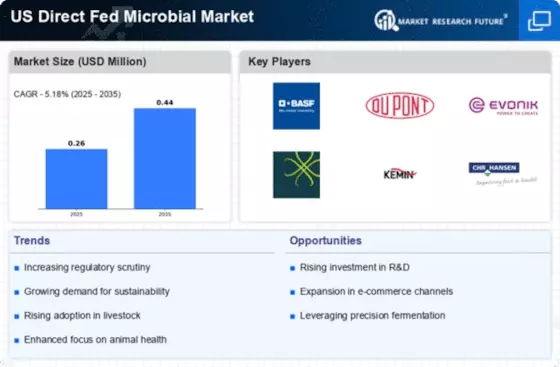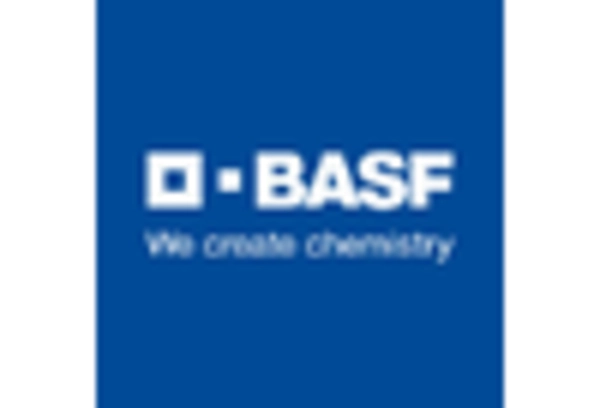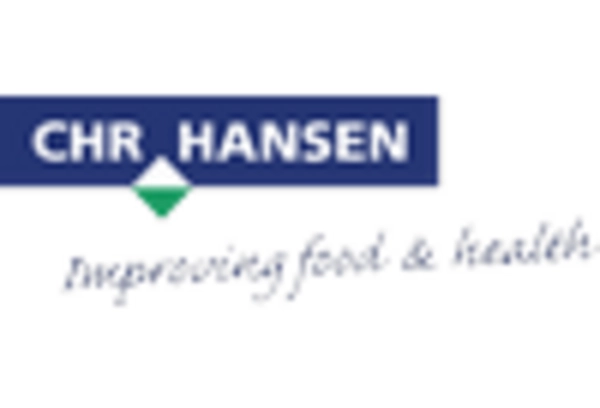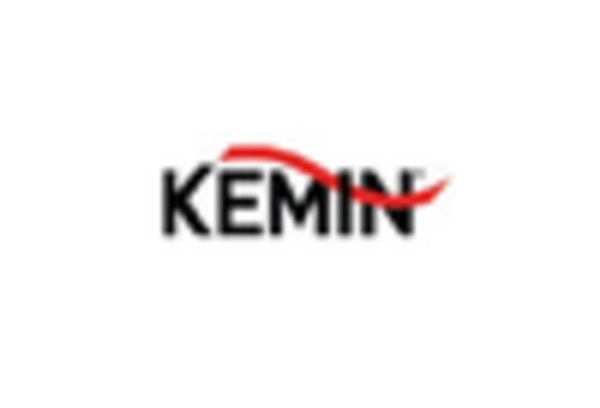Rising Livestock Production
The US Direct Fed Microbial Market is significantly influenced by the rising demand for livestock production. As the population continues to grow, the need for meat, dairy, and other animal products is escalating, prompting producers to seek efficient methods to enhance productivity. Direct fed microbial products are increasingly recognized for their ability to improve feed conversion rates and promote animal growth, making them an attractive option for livestock producers. Recent statistics indicate that the US livestock sector is expected to expand, with beef and poultry production projected to increase by 2% annually. This growth in livestock production is likely to drive the demand for direct fed microbial solutions, positioning the US Direct Fed Microbial Market for substantial expansion in the coming years.
Increasing Awareness of Animal Health
The US Direct Fed Microbial Market is experiencing a notable shift towards prioritizing animal health and welfare. As consumers become more conscious of the origins of their food, there is a growing demand for livestock products that are free from antibiotics and synthetic additives. This trend is driving farmers and producers to adopt direct fed microbial solutions, which are perceived as natural alternatives that enhance gut health and overall animal performance. According to recent data, the market for direct fed microbial products is projected to grow at a compound annual growth rate of approximately 7% over the next five years, reflecting the increasing emphasis on sustainable and health-conscious farming practices. This heightened awareness is likely to propel the US Direct Fed Microbial Market forward, as stakeholders seek to align with consumer preferences and regulatory standards.
Consumer Preferences for Natural Products
Consumer preferences are shifting towards natural and organic products, significantly impacting the US Direct Fed Microbial Market. As consumers become more discerning about the ingredients in their food, there is a growing demand for livestock products that are produced without synthetic additives or antibiotics. This trend is prompting livestock producers to adopt direct fed microbial solutions, which are perceived as natural alternatives that support animal health and welfare. Market Research Future indicates that the demand for organic and natural livestock products is expected to grow by approximately 10% annually, reflecting the changing consumer landscape. This shift in preferences is likely to drive the adoption of direct fed microbial products, positioning the US Direct Fed Microbial Market for continued growth as it aligns with consumer values.
Sustainability Initiatives in Agriculture
Sustainability has emerged as a pivotal driver within the US Direct Fed Microbial Market. With the agricultural sector facing scrutiny over its environmental impact, there is a pressing need for practices that reduce carbon footprints and enhance resource efficiency. Direct fed microbial products contribute to sustainability by improving feed efficiency and reducing waste, thereby minimizing the environmental burden of livestock farming. The US government has introduced various initiatives aimed at promoting sustainable agricultural practices, which include the use of microbial solutions. As a result, the adoption of direct fed microbial products is likely to increase, aligning with both regulatory frameworks and consumer expectations for environmentally responsible farming. This trend suggests a robust growth trajectory for the US Direct Fed Microbial Market, as sustainability becomes a core component of agricultural strategies.
Technological Innovations in Microbial Applications
Technological advancements are playing a crucial role in shaping the US Direct Fed Microbial Market. Innovations in microbial formulations and delivery systems are enhancing the efficacy and stability of these products, making them more appealing to livestock producers. For instance, the development of encapsulated probiotics and targeted delivery mechanisms allows for improved survival rates of beneficial microbes in the gastrointestinal tract of animals. This technological progress is expected to bolster the market, as producers increasingly recognize the value of high-quality microbial solutions in optimizing animal health and productivity. The integration of technology in microbial applications may lead to a more competitive landscape within the US Direct Fed Microbial Market, as companies strive to differentiate their offerings through enhanced performance and reliability.
















